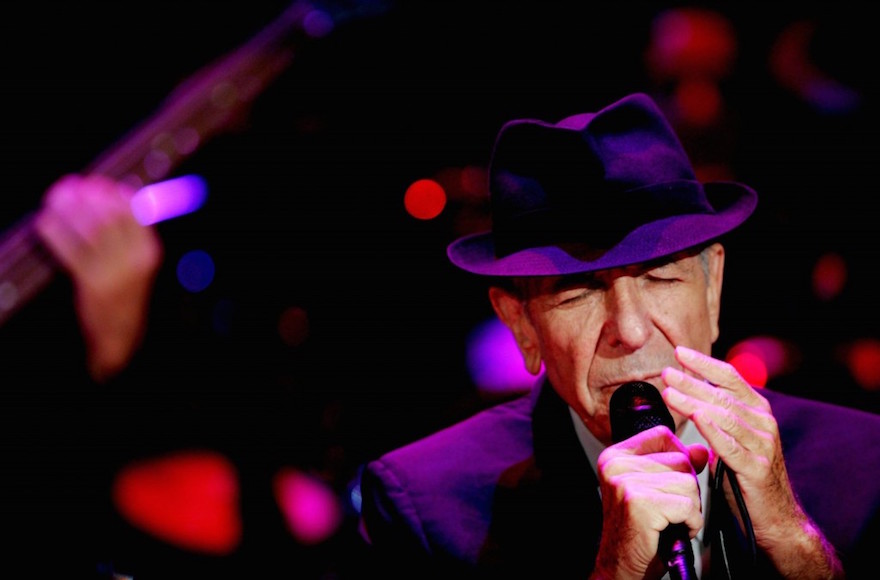Leonard Cohen, whose death was announced last night, was one of the most explicitly Jewish popular songwriters since the ancient King David, whose Psalms he expertly imitated over a five-decade career.
Cohen was the grandson of two distinguished Canadian rabbis, one of whom helped found many of Montreal’s central Jewish and Zionist institutions. The other, who wrote a thesaurus of the Talmud, was known as “Sar HaDikdukim,” the Prince of Grammarians.
Even as a practicing Buddhist, Cohen never stopped thinking of himself as a Jew, telling an interviewer, “I’m not looking for new religion. I’m quite happy with the old one, with Judaism.” But he was ecumenical in his range of subjects and references. Cohen’s first hit, “Suzanne,” speaks of perhaps the most famous Jew, Jesus, saying, “he himself was broken, long before the sky would open. Forsaken, almost human, he sank beneath your wisdom like a stone.”
Cohen, himself a master of language, saturated his lyrics with the Biblical imagery and Jewish liturgy he knew intimately. His songs adapted well known Jewish prayers and retold Judaism’s central stories. Here are five of his most Jewish songs:
Hallelujah
Cohen’s most famous song, covered dozens of times, is an explicit allusion to the Psalms and stories from the Jewish prophets, from King David to Samson. The song opens:
Now I’ve heard there was a secret chord
That David played, and it pleased the Lord
But you don’t really care for music, do you?
The second verse melds two Biblical stories. It opens telling the story of David seeing Batsheva, his future wife, bathing on a rooftop, and ends with imagery of her tying him down and cutting his hair — an allusion to Samson and Delilah.
Who By Fire
Another of Cohen’s most well-known songs, “Who By Fire” is an adaptation of “Unetaneh Tokef,” the central High Holiday prayer. The prayer’s verses narrate the Day of Judgment, describing the various ways people will live, die, succeed and suffer over the coming year. Cohen adapts the language almost word-for-word:
And who by fire, who by water
who in the sunshine, who in the night time
who by high ordeal, who by common trial
who in your merry, merry month of May
who by very slow decay
and who shall I say is calling?
You Want It Darker
One of Cohen’s last songs, “You Want It Darker,” was released two months ago, and in it, Cohen talks about preparing for death. The very Jewish lyrics include a chorus where Cohen says, “Hineni, I’m ready my Lord.” Hineni, Hebrew for “here I am,” is the word Abraham uses to respond to God when called to sacrifice Isaac, as well as the name of a prayer of preparation and humility, addressed to God, chanted by the cantor on Rosh Hashanah. And a recurring verse echoes the language of the Kaddish, the mourner’s prayer.
Magnified, sanctified be thy holy name
Vilified, crucified in the human frame
A million candles burning for a help that never came
You want it darker, we kill the flame.
The Story of Isaac
One of Cohen’s more obscure songs is a retelling of the sacrifice of Isaac. Speaking from Isaac’s perspective, the song questions the morality of the story:
You who stand above them now
Your hatchets blunt and bloody
You were not there before
When I lay upon a mountain
And my father’s hand was trembling
With the beauty of the word.And if you call me brother now
Forgive me if I inquire
Just according to whose plan
When it all comes down to dust
I will kill you if I must
I will help you if I can.
If It Be Your Will
This song’s title is a translation of “Ken Yehi Ratzon,” a Hebrew liturgical phrase directed to God. The song is also addressed to God, and includes lyrics evoking imagery from Kabbalat Shabbat, the Friday evening prayer service welcoming Shabbat, of nature rejoicing:
If it be your will
If there is a choice
Let the rivers fill
Let the hills rejoice.
We’ll miss you, Leonard.
https://www.youtube.com/watch?v=AEzRXjg1rYE
JTA has documented Jewish history in real-time for over a century. Keep our journalism strong by joining us in supporting independent, award-winning reporting.






